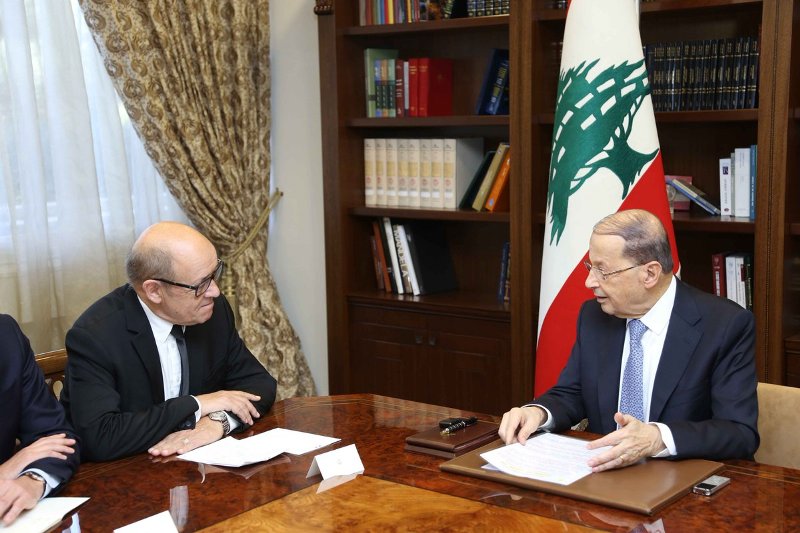Beirut – The visits of European officials to Beirut reflect a central interest in bolstering the capabilities of the Lebanese army through training programs, presenting aid to the military, and preserving stability.
The timing of the visits however indicates that they go beyond focusing simply on the army, but they also address the case of Syrian refugees in Lebanon and the repercussions of President Michel Aoun’s statements on “Hezbollah’s” weapons and the violation of United Nations Security Council resolution 1701.
Informed sources told Asharq Al-Awsat that Lebanese officials voiced to the Europeans their concerns over the burden of Syrian and Palestinian refugees in Lebanon, the threat of terrorism along its eastern border, and “Israel’s intimidation of the country” in reference to Israeli threats to wage a new war against Lebanon.
French Defense Minister Jean-Yves Le Drian arrived in Beirut on Monday, kicking off his tour with talks with Aoun.
The president thanked the minister for “the support France is offering Lebanon in all fields, especially the military one,” hoping that this support will continue to enable the army to carry out its national duties, especially in regards to preserving security and stability and combatting terrorism.
For his part, Le Drian stressed his country’s commitment to continue on presenting aid to the Lebanese army, most notably those that were pledged by President Francois Hollande during his last trip to Lebanon.
Le Drian later held talks with his Lebanese counterpart Yaacoub al-Sarraf during which the French official stressed his country’s support for Lebanon’s safety and sovereignty, “which should take place through respecting state institutions and the presence of an organized and united army.”
The French minister’s visit came three days after the visit of European Union counter-terrorism coordinator Gilles de Kerchove and Spanish Defense Minister Maria Dolores de Cospedal.
A prominent security source told Asharq Al-Awsat that western countries’ interest in the army’s training programs “stems from the aim to raise the capabilities of the army,” noting that the majority of the aid is American.
The source said that “the Lebanese army has shown high capabilities in combatting terrorism in Arsal and Ras Baalbek in eastern Lebanon” along the Syrian border where extremist groups are deployed.
Even though the army is not a member of the international alliance to combat terrorism, it still counts as being part of the countries that are taking part in it and “the global forces that are fighting terror,” it added.
The officials have also raised questions on resolution 1701 and the case of the Syrian refugees in Lebanon. Sources monitoring the visits told Asharq Al-Awsat that the “the danger of terrorism, Israeli threats, and expanding the army’s capabilities are issues that are always present in western officials’ talks.”
The sources said that Aoun’s description of “Hezbollah’s” weapons as being “complementary” to that of the Lebanese army during his visit to Egypt in February “raised global uproar over resolution 1701”, which calls for creating an arms-free zone between the Blue Line and the Litani River in the South, except those of United Nations Interim Force in Lebanon.
The European officials addressed this issue during their visits to Lebanon, with some being more vocal about the remarks and others “understanding Lebanon’s circumstances,” continued the sources.
They added that Lebanese officials, especially Foreign Minister Gebran Bassil “clearly state that Lebanon is not keen on war or destruction and that it stands in the position of self-defense.”
“It does not violate any of the articles of resolution 1701 as opposed to Israel,” they said.
Regarding the case of Syrian refugees and claims of setting up a safe zone for them in Syria, the sources revealed that the European officials “do not offer clear details on these efforts. They instead offer thanks to the Lebanese people and appreciate Lebanon’s position seeing as it is supporting more than it can handle.”
“Lebanese officials do not cease to demand Europeans to find a solution to the refugee crisis in Lebanon, because this issue is not linked to the Syrians alone, but in Lebanon’s ability to host a large number of Syrian and Palestinian refugees” and the repercussions that incurs, they remarked.
Lebanese officials constantly demand European officials to help Lebanon “remain an example of diversity and an outlet for all sides in the Middle East,” continued the sources.
